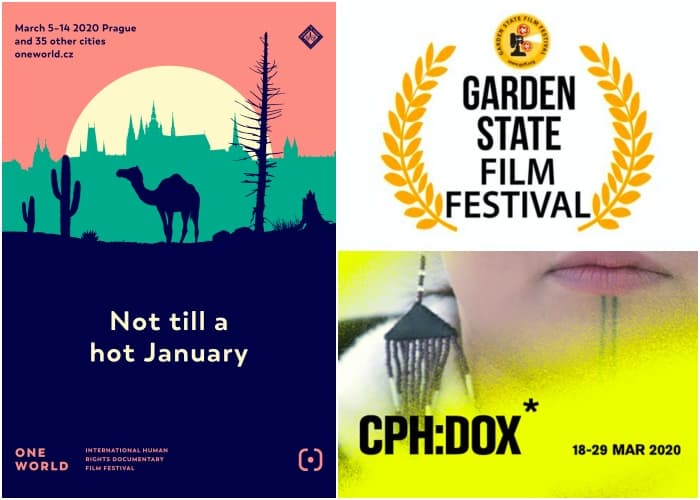
As more and more of our entertainment options tend to be online these days, film festivals offer an opportunity for communal enjoyment of movies on a big screen. International and regional festivals present screenings of films that won’t wind up playing our local cinemas — they’ll go straight to VOD or streaming sites only, if available at all — so movie lovers need these events in order to see the films properly, both in terms of size and social experience. Film festivals also provide other shared experiences such as panel discussions, workshops and masterclasses, parties and networking events, and other activities.
So what happens now that the COVID-19 coronavirus pandemic has limited large gatherings? Most film festivals are, unfortunately, being forced to shut down, whether that means complete cancellation or indefinite postponement. South by Southwest would have kicked off its film festival this week, but as the first major event of its kind to shutter, with very little notice, its backup plans were nonexistent. While some of its films are going forward with premieres anyway and other titles are still being covered remotely by critics, plus awards will still be announced, SXSW was essentially closed before it even opened.
That won’t be the case for all film festivals, some of which announced alternative plans this week to operate entirely in the digital space. Movies will be available online, streaming through partnerships with various platforms on the web. Some festivals are also moving some of their public and private events online, where possible. The experience obviously isn’t going to be the same, but organizers are doing their best to adhere to a schedule and keep functions relatively active for would-be attendees, not just dump the films to a streaming outlet and uploading workshops to YouTube.
Take, for example, the One World Human Rights Documentary Festival, which was already underway in the Czech Republic when the country declared a ban on public gatherings of more than 100 people. One World, which is the largest annual human rights film festival on the planet, had no choice but to end all screenings and other communal events and activities. But that wasn’t the end of this year’s festival. A few days after the interruption, the festival announced a partnership with the Prague-based Doc Alliance streaming platform (DAFilms.com) to present this year’s remaining titles digitally.
Films are becoming available on the One World website daily from March 12th through March 17th. And at least one competition title, Linda Kallistová Jablonská’s dogsled doc Doggy Love, had its world premiere online but was only viewable during a limited timeframe: 7 pm to 3 am (Central European Time Zone). That strict availability made the film’s debut more of an event, similar to a time-specific screening. The programmed films are not just for pass holders and others who’d have been there, either — they cost CZK 59 (about $2.50) per title a la carte. However, they aren’t accessible everywhere (the US is excluded, for instance).
Another documentary festival, CPH:DOX (aka the Copenhagen International Documentary Festival), was the first film festival to announce a digital alternative. Initially, they’d announced the festival would continue without its larger happenings, including their opening night gala. But then one week before it was set to begin, the prestigious Danish event canceled all physical parts of this year’s fest due to the government’s public gathering restrictions. Plans are now underway to create a program of titles online — only a fraction of the 220 titles that were set to screen — through a partnership with the streaming platform Festival Scope.
Additionally, CPH:DOX will be continuing with its six competition programs. Juries are still watching all of the titles in their respective sections in order to give out awards at the end of the month. Critics are also receiving access to documentaries in order to cover with reviews, interviews, etc., while the film market is operating digitally for accredited industry “guests.” Other industry events and activities, including a financing and co-production forum, a development lab, and a five-day conference “will be carried out digitally to a great extent,” according to a festival’s statement.
Documentary festivals aren’t the only events going digital. While One World and CPH:DOX were the first big fests to announce such plans, the smaller Garden State Film Festival, based in Asbury Park, New Jersey, joined them at the end of this week. Compared to the near 100,000 and 125,000 attendance of the two doc fests, Garden State attracts a crowd of around 25,000 each year. Still, they’ve got a lot of movies (including many docs) that would otherwise go unseen with a complete cancelation. Among their bigger ticket items are locally premiering dramas starring Matthew Modine and Linda Hamilton.
Garden State seems to be doing time-specific live-stream screenings, including one opening night for Stanley Kubrick’s Full Metal Jacket (pending permission — UPDATE: it’s not happening) and another for the Quentin Tarantino-focused documentary QT8: The First Eight. Most of the screenings will happen during the weekend of March 28-29, but whether they’re all subject to specific showtimes is not clear, though it does seem all original screening blocks will be the same for the virtual version of the festival. Viewing the films will still require festival tickets or passes. Unfortunately, industry activities, workshops, and panels are completely canceled.
In each of these festivals’ announcement of their digital continuation, the given priority is the safety of their would-be attendees. Fortunately, they also are able to accommodate some of the filmmakers and their staff to some degree by, and in addition to, maintaining their primary service of presenting movies with, and to, an audience. Those capable of the virtual alternative certainly stand out, and none of them should be looked at as breaking the system with their digital solutions. Once allowed to, fans are going to want the real deal again, so there’s no way this is the future of film festivals, just a temporary substitute.
Related Topics: COVID-19, CPH:DOX, Film Festivals
